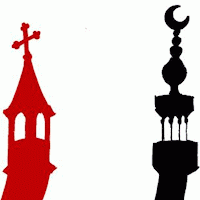![]()
Wed, Sept 14, 2011 | Rubin Reports | By Barry Rubin

The solidarity "Stand for Israel" event, outside the Israeli Embassy, was organised by British group Mordechai's Voice, intended to be a platform for British Christians to demonstrate their belief in Israel's right to exist and right to freedom from terror. (London, July 2011)
What Jews should know about Christians
A shorter version of this article was published in the Jerusalem Post.
Most Jews today (or should I merely say many?), even the most secular among them, have a tremendous fear of Christians — especially fervent believers of the type represented today by Evangelicals — and conservatives. There is a material basis for this fear based on past Jewish experience. But it is the year 2011; things have changed; and it is time to reconsider these assumptions and see if they still make sense.
Let me begin by mentioning two specific situations I have witnessed that show the foolishness of this blindness:
1. In a particular city a group of Jews organized a march for Israel. Several Christian groups wanted to participate. Since some elements among the Jews disagreed with the Christians on other political issues, they cancelled the march rather than participate alongside pro-Israel Christians.
2. In a particular other city, an Israeli speaker was invited to speak by the main pro-Israel Jewish group. He was also invited to speak by a respectable pro-Israel Christian group. The potential speaker was informed that if he spoke for the Christian group the pro-Israel Jewish group would refuse to have him as a speaker.
This kind of behavior is simultaneously shameful and stupid. We are not speaking here of political sophistication but about a mode of thinking equivalent to a fear of catching cooties.
True, in general, for almost 2000 years many Christians and their institutions have often persecuted Jews, either materially or at least had very negative views toward Jews. In this short space I will not attempt to review that history or get beyond generalizations. Readers are able to do that for themselves.
For 200 years, modern conservative and nationalist thought in the West has also often persecuted Jews, in words, attitudes, and actions. A good starting point for that phase is the triumph of German nationalists over Napoleon and the reversal of the French revolution’s grant of rights to Jews in those lands. And of course the culmination was in the Nazi death camps.
It is understandable, then, that Jews supported parties of the liberal and left type where they were welcomed, where modernity was extolled, and where Jews believed they could integrate with the masses and thus defuse grassroots’ antisemitism. That strategy made perfect sense.
With Communism’s betrayal of the Jews, the contemporary tendency for the far left to take over traditional social democratic and liberal institutions, and the left’s romance with Third World (and particularly Palestinian, Arab, and Islamist radicalism), the world has changed. The left has largely abandoned Israel as a cause, often become antagonistic, and even evinces antisemitism.
There is still hope for reviving the social democratic and liberal tradition of being pro-Jewish and pro-Israel, but that won’t happen until the infiltration and seizure of intellectual hegemony of the far left is defeated.
Meanwhile, there has also been a change among many Christians (especially those called Evangelicals) and conservatives toward a greater friendship regarding Jews and Israel. A key reason for this shift — and proof of its authenticity — are a set of transformations in the thinking of these groups.
Before discussing the details, though, let me make it clear that Jews do not have to become conservatives or even agree with them — or with Evangelical Christians — on a wide range of issues. What is worthwhile, however, is to accept the offer of friendship on certain specific issues, respectfully disagree on others, and not demonize such people.
As noted above, many conservatives and pious Protestants have changed their view of Jews. Factors that once made for antisemitism have now been reversed. Here is a brief summary:
— Formerly, Jews were seen as subverting Christianity. Now, in an increasingly secular world, Jews (even only slightly religious ones) are seen as fellow believers, allies in preserving religiosity in the face of huge challenges.
— A key element in antisemitism were Christian doctrines defining Jews as the “suffering servant” whose humiliation proved Christianity to be correct and “replacement theology” which says that Jews are no longer a “chosen people” but their role has been replaced by Christians. These ideas have been widely abandoned by Evangelicals. There is a new interest — and gratitude — at the Jewish roots of Christianity and a view of Jews as fellows in a Judeo-Christian religious community.
They are very much aware of Biblical verses that, for example, say that the creator of the universe will not bless those who attack or hate the Jewish people. There is also a real understanding of the history of the Holocaust and past antisemitism along with a desire to make amends. While there are those seeking converts, of course, and some who believe that supporting Jews will bring Armageddon, these are largely outdated concepts
— Conservatives tended to view Jews as cosmopolitan anti-nationalists, leftists, and pacifists. Today, however, the existence of Israel has given a different perspective on this. Jews, in the eyes of most conservatives, have created a model nation-state, a country that is willing and able to fight in its self-defense, where religion is respected as an important element in Jewish peoplehood.
— An especially important question has been how conservatives deal with the fact that there are so many Jews on the left, that is, among their political opponents and those who fight against religion in various ways. In the twentieth century especially, this was a huge source of antisemitism and a central element in Nazi doctrine.
Contemporary conservatives have, however, developed a new way of viewing this issue. First, of course, they have observed the left’s growing antagonism against Israel and even against Jews. Most importantly, they view leftist and anti-religious Jews as enemies of their own people. This neatly dispenses with a traditional core issue of antisemitism.
Someone like, say, Noam Chomsky is not seen as part of the Jewish conspiracy against America but as a person who has so broken with his Jewish roots and the interests of his people to be as much against the Jews as he is against his country or conservative values. In a sense, this concept parallels what most Jews — especially the religious and the pro-Israel majority — also think of such people.
In France and Italy, Holland and Spain, the United Kingdom and Scandinavia, conservative parties are more pro-Israel than their counterparts on the left. This has less to do with Israeli or Jewish behavior — whatever claims are made to the contrary — than it does the philosophical and political evolution of politics within those countries.
Let me make this absolutely clear: to cooperate with liberals on supporting Israel one need not be a liberal; to cooperate with conservatives on supporting Israel one need not be a conservative. To cooperate with Christians on supporting Israel one need not be a Christian.
Of course, a distinction must be made between much larger conservative forces and smaller neo-fascist ones. The Le Pen party in France, the British National Party, and other forces continue the historic antisemitism of the right-wing. In the United States, right-wingers like Pat Buchanan and Ron Paul also still hold traditional antisemitic concepts.
Yet the Jewish people have always survived by a willingness to understand the world as it is and to act as necessary without sacrificing core principles. While working to maintain and rebuild relations with real liberal and moderate social democratic forces where possible, Israel and Jews should also shake the extended hand of conservatives and Christians which is so often sincerely offered.



 RSS
RSS










What Jews should know about Christians | Middle East News, Articles, Background, Opinion, Analysis http://t.co/SQAyAaSs
What Jews should know about Christians | Middle East News, Articles, Background, Opinion, Analysis http://t.co/SQAyAaSs
What Jews should know about Christians | Middle East News … http://t.co/ZzQWeW3w